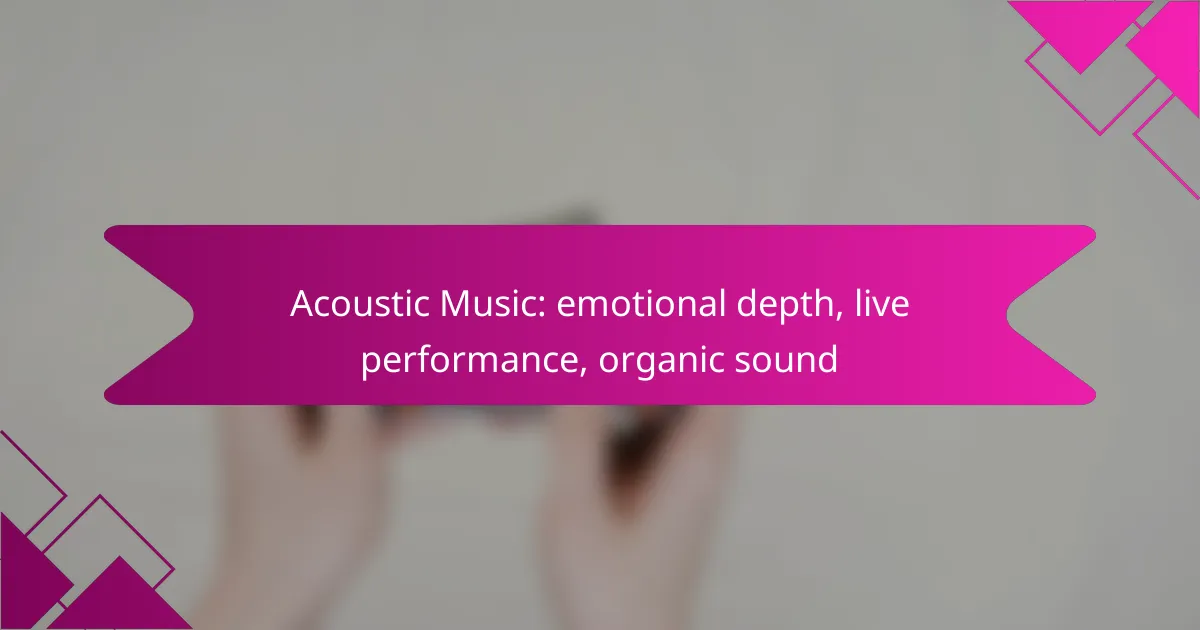Acoustic music captivates audiences with its emotional depth and organic sound, creating an intimate atmosphere that resonates deeply with listeners. The raw expression of feelings through simple instruments allows for a powerful connection, often evoking personal memories and experiences. Whether experienced at a festival or a cozy venue, the beauty of acoustic performances lies in their ability to convey profound emotions through unfiltered sound.
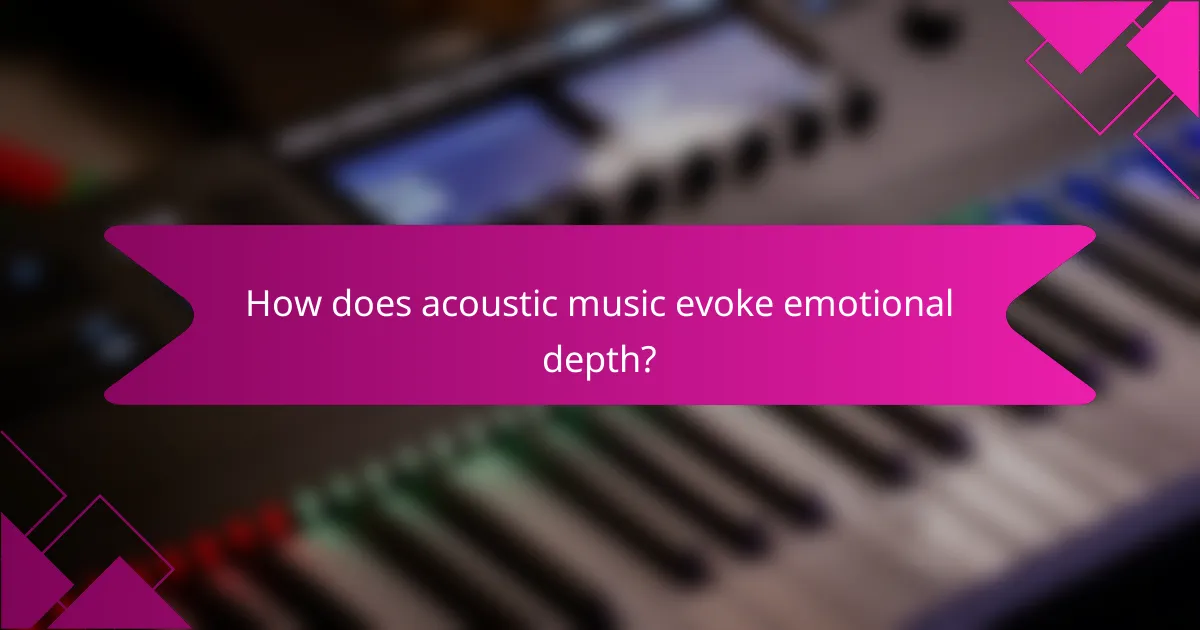
How does acoustic music evoke emotional depth?
Acoustic music evokes emotional depth through its organic sound and intimate connection with listeners. The simplicity of acoustic instruments allows for a raw expression of feelings, often resonating with personal experiences and memories.
Connection to personal experiences
Listeners often connect acoustic music to their own life stories, enhancing the emotional impact. The relatable themes and melodies can trigger memories, making the experience deeply personal.
For example, a song about heartbreak may resonate with someone who has gone through a similar situation, creating a shared emotional landscape that enhances the music’s depth.
Use of natural harmonics
Natural harmonics in acoustic music contribute to its emotional resonance by creating a warm, inviting sound. Instruments like guitars, pianos, and violins produce rich overtones that evoke a sense of nostalgia and comfort.
This organic sound can evoke feelings ranging from joy to melancholy, allowing listeners to experience a wide spectrum of emotions through simple melodies.
Storytelling through lyrics
Lyrics in acoustic music often tell compelling stories that draw listeners in. The narrative quality of the lyrics can evoke empathy and understanding, making the emotional experience more profound.
For instance, a song that narrates a journey or a struggle can resonate with listeners, allowing them to reflect on their own life experiences and emotions.
Influence of instrumentation
The choice of instruments in acoustic music plays a crucial role in shaping its emotional depth. Each instrument brings its own character and emotional weight, influencing how a piece is perceived.
For example, a solo acoustic guitar may create a sense of solitude, while a full string ensemble can evoke feelings of warmth and community, enhancing the overall emotional experience.
Live audience interaction
Live performances of acoustic music often foster a unique connection between the artist and the audience. The intimate setting allows for real-time emotional exchanges, enhancing the overall experience.
Musicians can respond to audience reactions, creating a dynamic atmosphere that amplifies the emotional depth of the performance, making each show a unique experience for both the performer and the listeners.
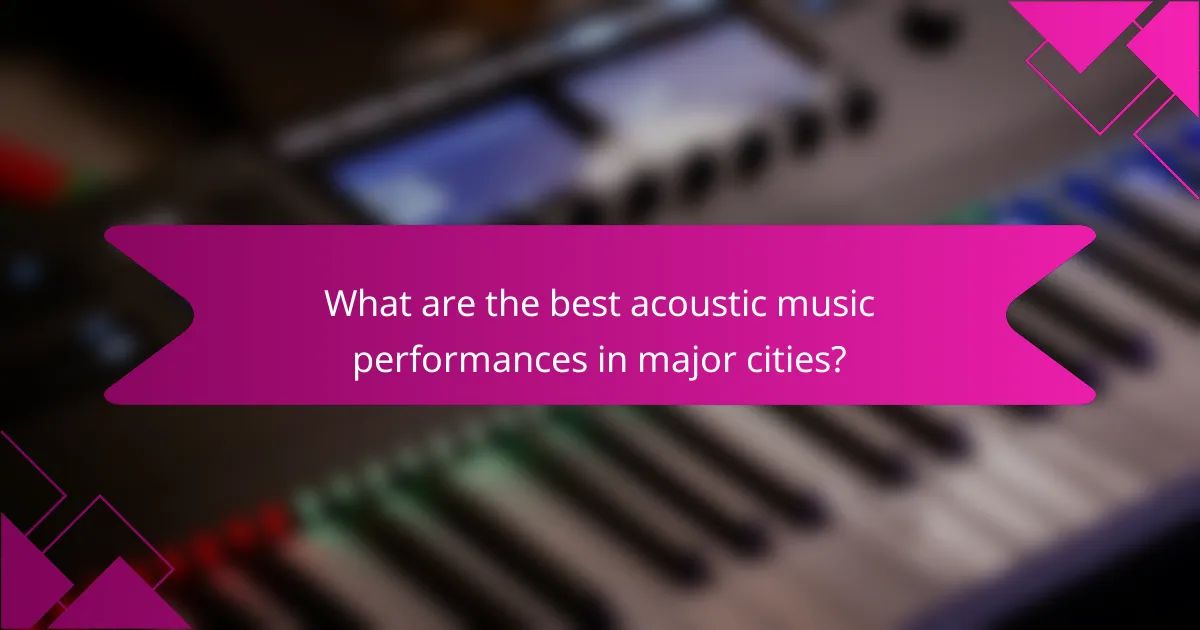
What are the best acoustic music performances in major cities?
Some of the best acoustic music performances can be found at renowned festivals and iconic venues across major cities. These events showcase a range of artists and styles, emphasizing the emotional depth and organic sound that acoustic music offers.
Newport Folk Festival highlights
The Newport Folk Festival, held annually in Rhode Island, is a cornerstone of acoustic music, featuring both legendary and emerging artists. Highlights often include surprise collaborations and unique interpretations of classic songs, creating an intimate atmosphere that resonates with audiences.
Attendees can expect performances from a diverse lineup, typically spanning folk, bluegrass, and Americana genres. The festival encourages a sense of community, allowing fans to connect with artists and each other in a picturesque seaside setting.
Woodstock Music Festival legacy
The Woodstock Music Festival, originally held in 1969, remains a symbol of the acoustic music movement. Its legacy is marked by performances from iconic artists like Bob Dylan and Joan Baez, who brought acoustic music to the forefront of popular culture.
Modern events inspired by Woodstock continue to celebrate this legacy, often featuring a mix of contemporary and classic acoustic acts. These festivals emphasize peace, love, and music, drawing large crowds eager to experience the spirit of the original event.
London’s Royal Albert Hall concerts
The Royal Albert Hall in London is renowned for hosting exceptional acoustic music concerts, featuring both solo artists and ensembles. The venue’s unique architecture enhances the sound quality, making it a favorite among musicians and audiences alike.
Concerts here often include a mix of classical, folk, and contemporary acoustic performances. Attendees can enjoy a rich auditory experience, with many events showcasing the emotional depth that acoustic music can convey.
Los Angeles Troubadour showcases
The Troubadour in Los Angeles is a historic venue known for its intimate setting and rich musical history. It has hosted countless acoustic artists, from legends like James Taylor to contemporary singer-songwriters, making it a must-visit for acoustic music lovers.
Shows at the Troubadour often feature up-and-coming talent alongside established acts, providing a platform for diverse acoustic sounds. The venue’s close-knit atmosphere allows for a personal connection between artists and their audience, enhancing the overall experience.
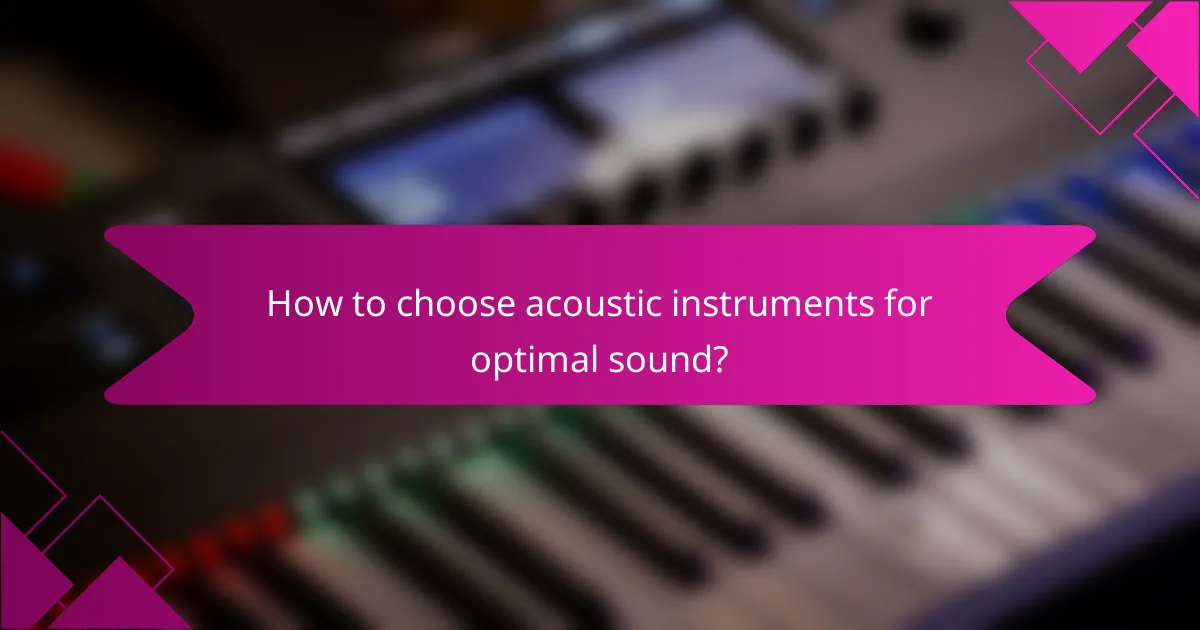
How to choose acoustic instruments for optimal sound?
Selecting acoustic instruments for optimal sound involves understanding the characteristics of each type and how they contribute to the overall tone and emotional depth of your music. Consider factors like the material, construction, and intended use to ensure you achieve the desired organic sound.
Guitar types: acoustic vs. classical
Acoustic guitars typically have steel strings and a brighter, more powerful sound, making them suitable for various genres, including folk and rock. In contrast, classical guitars use nylon strings, producing a warmer, softer tone that is ideal for classical and flamenco music.
When choosing between these types, consider your playing style and the genre you wish to perform. Acoustic guitars are often favored for their versatility, while classical guitars excel in fingerstyle techniques.
Best microphones for live acoustic sound
For live acoustic performances, dynamic and condenser microphones are popular choices. Dynamic mics are durable and handle high sound pressure levels well, making them suitable for louder environments. Condenser mics, on the other hand, capture a broader frequency range and are ideal for softer, nuanced performances.
When selecting a microphone, consider the venue size and your sound source. For larger venues, a condenser mic may provide the clarity needed, while a dynamic mic can be more practical for smaller, more intimate settings.
Choosing the right strings for tone
The choice of strings significantly affects the tone of your acoustic instrument. For guitars, consider the gauge, material, and winding type. Lighter gauge strings are easier to play and bend, while heavier strings produce a fuller sound but require more finger strength.
Experiment with different materials, such as phosphor bronze or silk and steel, to find the tone that best suits your style. Regularly changing strings can also enhance sound quality, as older strings tend to lose their brightness and clarity over time.
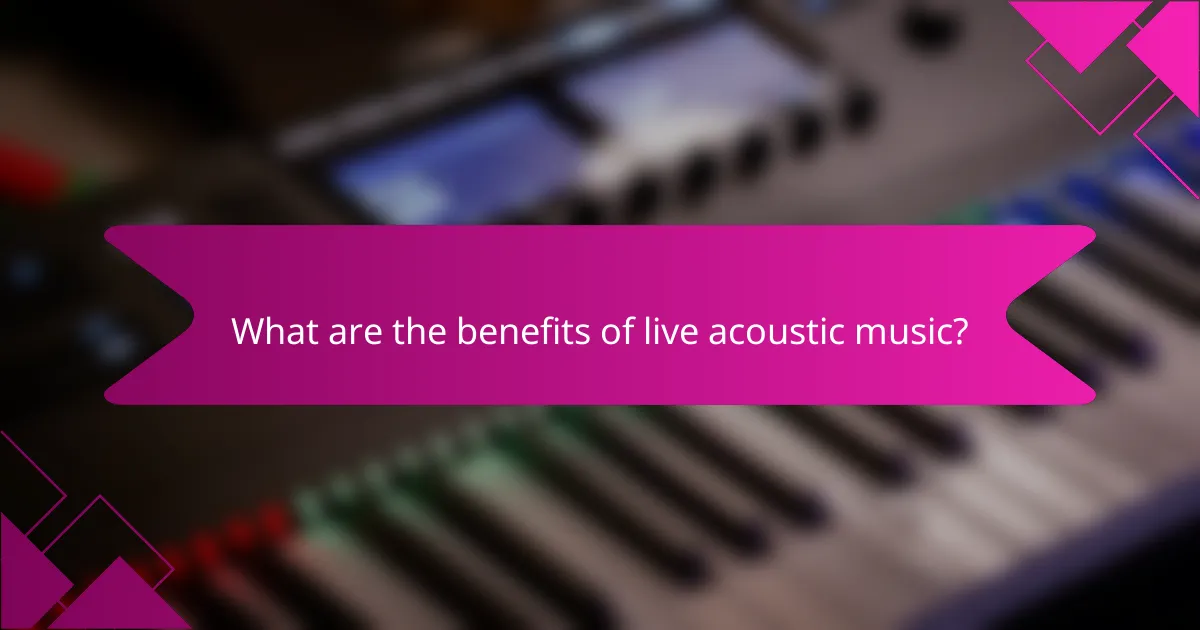
What are the benefits of live acoustic music?
Live acoustic music offers a rich emotional experience that connects artists and audiences through organic sound. The intimate nature of these performances enhances the overall enjoyment and appreciation of the music.
Enhanced audience engagement
Live acoustic music fosters a deeper connection between performers and their audience. The stripped-down nature of acoustic performances often encourages listeners to focus on the lyrics and melodies, creating a more immersive experience.
Engagement can be amplified through interactive elements, such as sing-alongs or storytelling, which invite the audience to participate actively. This interaction can lead to memorable moments that resonate long after the performance ends.
Unique sound experience
The organic sound of acoustic instruments provides a distinct auditory experience that differs from amplified music. Instruments like guitars, violins, and pianos produce rich tones that can evoke a wide range of emotions.
Each performance is unique, as factors like venue acoustics and the artist’s interpretation contribute to the overall sound. This variability can make attending live acoustic shows particularly special, as no two performances are ever quite the same.
Support for local artists
Attending live acoustic music events often means supporting local musicians who rely on community engagement for their livelihoods. These performances provide artists with a platform to showcase their talent and connect with fans.
By choosing to attend local shows, audiences help sustain the local music scene, ensuring that diverse voices and styles continue to thrive. This support can be crucial for artists trying to establish their careers in a competitive industry.
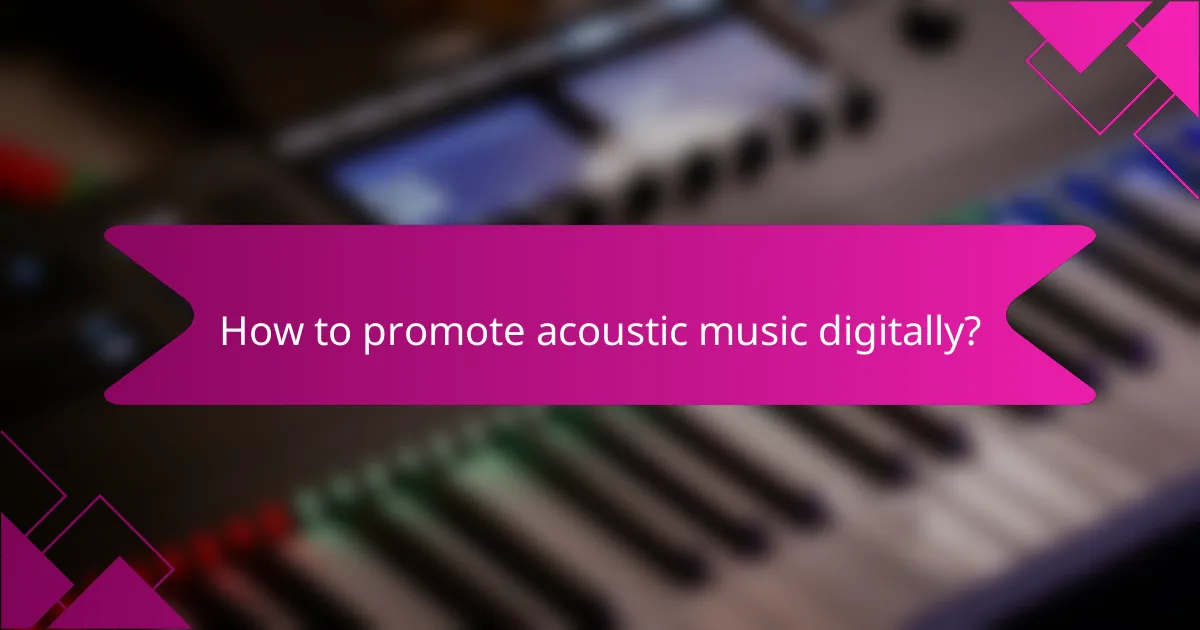
How to promote acoustic music digitally?
Promoting acoustic music digitally involves leveraging online platforms to reach a wider audience and create meaningful connections. Focus on engaging content and interactive strategies to showcase the emotional depth and organic sound of your music.
Utilizing social media platforms
Social media platforms are essential for promoting acoustic music, as they allow artists to connect directly with fans. Use platforms like Instagram, Facebook, and TikTok to share snippets of live performances, behind-the-scenes content, and personal stories that highlight the emotional aspects of your music.
Engage with your audience by responding to comments and messages, and consider hosting live Q&A sessions or performances. Consistent posting and authentic interactions can significantly increase your visibility and foster a loyal fan base.
Creating engaging video content
Video content is a powerful tool for showcasing acoustic music’s organic sound and emotional depth. Create high-quality videos of your performances, whether in intimate settings or larger venues, to capture the essence of your music.
Consider producing tutorials, song breakdowns, or storytelling videos that explain the inspiration behind your songs. Platforms like YouTube and Instagram Reels can help you reach a broader audience, so focus on creating visually appealing and emotionally resonant content.
Leveraging streaming services like Bandcamp
Streaming services like Bandcamp provide a platform for artists to sell their music directly to fans while retaining a larger share of revenue. Set up a profile to showcase your acoustic tracks, offering options for digital downloads and physical merchandise.
Utilize Bandcamp’s features, such as pre-orders and exclusive releases, to create buzz around new music. Promoting your Bandcamp page through social media and email newsletters can drive traffic and increase sales, allowing you to build a sustainable income from your acoustic music.
